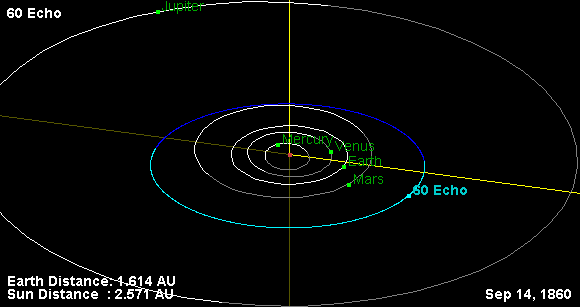60 Echo on:
[Wikipedia]
[Google]
[Amazon]
Echo ( This object is orbiting the Sun with a period of , a semimajor axis of , and an eccentricity of 0.18. Its orbital plane is at an inclination of 3.6° to the plane of the ecliptic. This is a stony S-type asteroid with a cross-sectional size of 60.2 km that is spinning with a
This object is orbiting the Sun with a period of , a semimajor axis of , and an eccentricity of 0.18. Its orbital plane is at an inclination of 3.6° to the plane of the ecliptic. This is a stony S-type asteroid with a cross-sectional size of 60.2 km that is spinning with a
minor planet designation
A formal minor-planet designation is, in its final form, a number–name combination given to a minor planet (asteroid, centaur, trans-Neptunian object and dwarf planet but not comet). Such designation always features a leading number (catalog or ...
: 60 Echo) is a quite large main-belt asteroid
An asteroid is a minor planet of the inner Solar System. Sizes and shapes of asteroids vary significantly, ranging from 1-meter rocks to a dwarf planet almost 1000 km in diameter; they are rocky, metallic or icy bodies with no atmosphere.
...
. It was discovered by James Ferguson of the United States Naval Observatory in Washington D.C., on September 14, 1860. It was his third and final asteroid discovery. It is named after Echo, a nymph in Greek mythology. James Ferguson had initially named it "Titania", not realizing that name was already used for a satellite of Uranus.
 This object is orbiting the Sun with a period of , a semimajor axis of , and an eccentricity of 0.18. Its orbital plane is at an inclination of 3.6° to the plane of the ecliptic. This is a stony S-type asteroid with a cross-sectional size of 60.2 km that is spinning with a
This object is orbiting the Sun with a period of , a semimajor axis of , and an eccentricity of 0.18. Its orbital plane is at an inclination of 3.6° to the plane of the ecliptic. This is a stony S-type asteroid with a cross-sectional size of 60.2 km that is spinning with a rotation period
The rotation period of a celestial object (e.g., star, gas giant, planet, moon, asteroid) may refer to its sidereal rotation period, i.e. the time that the object takes to complete a single revolution around its axis of rotation relative to the ...
of 25.2 hr. Echo has been studied by radar. It is not known to be a member of any asteroid family
An asteroid family is a population of asteroids that share similar proper orbital elements, such as semimajor axis, eccentricity, and orbital inclination. The members of the families are thought to be fragments of past asteroid collisions. An a ...
.
References
External links
* * {{DEFAULTSORT:000060 Background asteroids Echo Echo S-type asteroids (Tholen) S-type asteroids (SMASS) 18600914